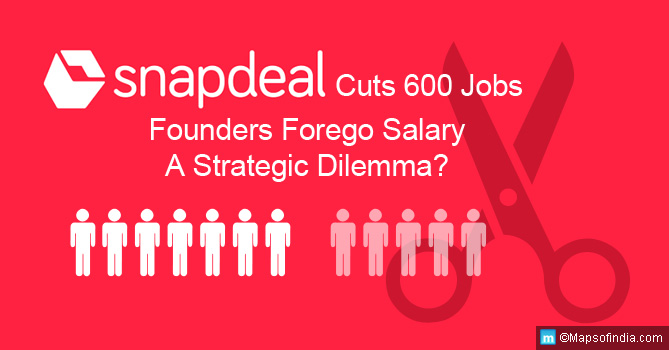No matter the business model of the venture, or its size, or the fact that it is a small or large enterprise – the only yardstick by which the success of any enterprise can be measured is its profit. And that is where Snapdeal has slipped, its founders concede. Snapdeal is one of India’s earliest and biggest e-commerce players. The co-founders of Snapdeal, Kunal Bahl and Rohit Bansal, admitted to have made mistakes and revealed that the company will initiate a mass layoff to trim its size. The company will need to make huge changes to keep up with the changing ways of the industry.
Mass Layoff and Salary Cut On The Cards
The Gurgaon-based online retailer said that between 600 and 1,000 employees from its e-commerce operations and from Freecharge, its payments division, and Vulcan Express, its logistics branch, will be laid off. Snapdeal’s three branches together have an estimated staff strength of about 8,000. The layoffs will affect all levels of employees and will be carried over the following weeks.
The employees asked to leave will be offered a three-month severance pay, news reports said. The exact number of employees to be retrenched has not been revealed, though.
To cut costs and to steer the company towards profitability, the co-founders have also decided to work without drawing a salary for an unspecified time. Bahl said, “Both Rohit and I are taking a 100 per cent salary cut”.
The founders of Snapdeal, Kunal Bahl and Rohit Bansal are both 33 years old and are among the very few high-profile Indian entrepreneurs to have decided to go without a salary altogether. They started Snapdeal some seven years ago. This decision, however, has failed to mollify many — given that both Bahl and Bansal individually drew a compensation of Rs 52.94 crore from the company for the last fiscal year.
Apart from a salary of Rs 1.5 crore each, they drew payments worth Rs 51.43 crore against their founder stock options. According to Snapdeal, a number of leaders in the company have voluntarily agreed to a cut in remuneration until the company tides over the crisis.
From Success To The Doldrums
Till about a couple of years ago, Snapdeal was the picture of entrepreneurial grit and success. The past year and half, however, have come in as a major disappointment in terms of its profitability while revenue figures still remained high. Estimates suggest that Snapdeal reported losses amounting to Rs 1,320 crore in 2014-15 and this figure almost doubled to Rs 3,000 crore in 2015-16.
In a letter to the employees, Kunal Bahl is reported to have said, “Over the last 2-3 years, with all the capital coming into the market, the company and the entire industry started making mistakes…We started growing our business much before the right economic model and market fit was figured out.”
The ongoing rivalry with Amazon and Flipkart has also drained the company. The e-commerce industry in India has been growing at a pace of about 12 percent over the past year and is now pegged at about US$14.5 billion. The market, however, is largely characterised by ongoing battles of deals and discounts and this has certainly taken its toll on Snapdeal.
The company is confident, though, of reversing its fortunes and regaining its profitability in a couple of years.
Snapdeal May Offload FreeCharge
According to news reports, Bahl and Bansal are also in the process of holding talks with a South African group, Naspers, with an intention to sell FreeCharge for about US$300 million. Snapdeal had acquired the online recharge platform FreeCharge in April 2015 for an estimated amount of US$400 million.
The Chief Executive Officer (CEO) of FreeCharge, Govind Rajan quit the company a couple of days ago. As of now, Snapdeal has no intentions of selling Vulcan Express, its logistics division and is confident of the latter’s return to profitability.




